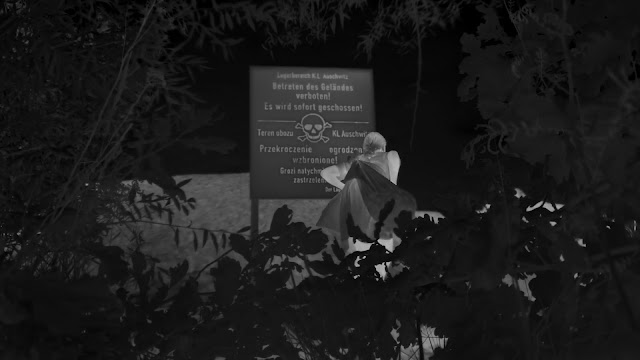
The Zone of Interest (Jonathan Glazer, 2023/2024)
Jonathan Glazer's long awaited film, The Zone of Interest, a loose adapatation of Martin Amis's titular novel, is a powerful viewing experience. Horrific atrocities that occur in the film are largely implied, heard and viewed from afar. Therefore, much of the horror is left to our imagination. Adjacent to the unseen nighmare, we're privvy to the domestic life of Rudolf Höss (Christian Friedel), commandant of the Auschwitz concentration camp, living next door to "the zone of interest" with his family.
Witnessing the commandant's family living with complete apathy right next to what can be best described as Hell is what makes this an incredibly powerful and chilling film. Höss isn't portrayed as some completely deranged pyschopath making it easy to differentiate from. He behaves like a normal individual towards his family; even feeling sad for his horse who he needs to leave behind due to work commitments. That's what makes this such a compelling experience; what appears like a normal individual being capable of committing monstrous actions. Two scenes which really highlight this is where he's having a mundane chat in bed with his wife, Hedwig, about a possible vacation in Italy, and it's immediably followed by a close shot of him overseeing prisoners being processed after their arrival at the death camp. The sounds are truly distressing and haunting. Not something that will be easy to forget any time soon.


Hedwig Höss (Sandra Hüller), the matriarch of the family, is also
complicit with the horror. She takes extreme pride of her
dream home. She even considers herself "the Queen of
Auschwitz", claiming that she would have to be dragged
away the paradise she lives in. Her staff, work in abject fear. One
of whom bearing the burden of Hedwig's annoyance is threatened with, "I
could have my husband spread your ashes across the fields of Babice." Chilling. There are hints throughout
the film that Hedwig came from poverty and is of a low class. Prisoners'
personal belongings are amusingly said to come from "Canada" by Hedwig
and her friends. Her callousness is spawned from the jealousy and resentment she harboured before fascism gave her and her family prosperity.
Smoke from steam engines carrying its human victims can be seen from the walled perimeter of the Höss's home. The dark and acrid smoke from the crematorium chimney can be observed both day and night. It's the final straw during a restless night for Hedwig's visiting mother. She realises that her former employer, Esther Silberman, might have suffered a horrific fate on the otherside of the wall. Ash is mixed with top soil by a prison labourer in the commandant's garden. The flowers looks beautiful. These sequences respectfully allow the audience to fill in the gaps.


Sound is integral to the film's
disturbing atmosphere. Our eyes might not witness the horror, but our
ears ghive some insight with what might be occuring offscreen. Barking
guard dogs, crackfire from a gun and the screams of helpless people are
very harrowing. The ghastly gutteral sound of furnaces at work is also
unsettling. These are all ambient sounds in the background of the Hoss
family dream home. What's more, it's the norm for the children. Claus
the oldest son, a collector of gold teeth, has fun at the expense of his
younger brother, Hans, by locking him in the greenhouse and mockingly
making the sound of hissing gas. It's rather obvious, the children know
exactly what is going on beyond the proximity of their grounds.
Micha Levi's soundtrack also plays a huge part. It's
minimal, and otherwordly modern, but complimentary and never out of
place. Glazer bravely begins the film by focusing on nothing but a black
screen for a few minutes. Once the viewer begins to adjust to the
cinematic depravation, a haunting choral and a strained string arrangment can be heard in the darkness. It's followed by chirping
birds and other familar woodland sounds, before the opening shot of the Höss family enjoying a day out by a picturesque lake.


While sound plays such a large part, visually, it's a stunning looking
film. For such a horrific event in history, everything looks sharp with
some superb composition. High resolution close-up shots of various flora
in the garden show beauty all while you're hearing the horrors past the
garden wall. Another example of the contrasts Glazer utilises in the
film. Certain scenes involve a young Polish girl placing apples and
various other food around a construction site in the darkness of night
for the starving prisoners to eat. These moments are shot with the aid
of thermal vision cameras. The effect looks ultra modern and somewhat
alien for a period piece, but it works remarkably well within the
context of the film.
Always annoying when all the wannabe Eberts, all-access shills, culture journos narcissists spew massive heaps of praise towards undeserving films. Words like "classic" and "masterpiece" are often unwarranted and used far too liberall. Jonathan Glazer's The Zone of Interest exemplifies these two descriptions during a time when they had real value. This is a tough and harrowing film to watch, but a supremely powerful story in modern cinema.













%20-%20Official%20Trailer%20HD%20-%20YouTube.png)








